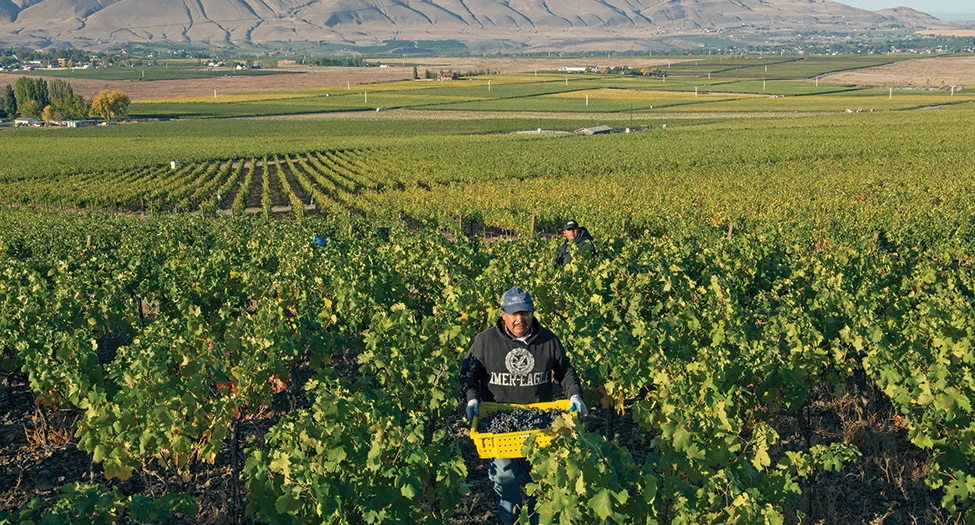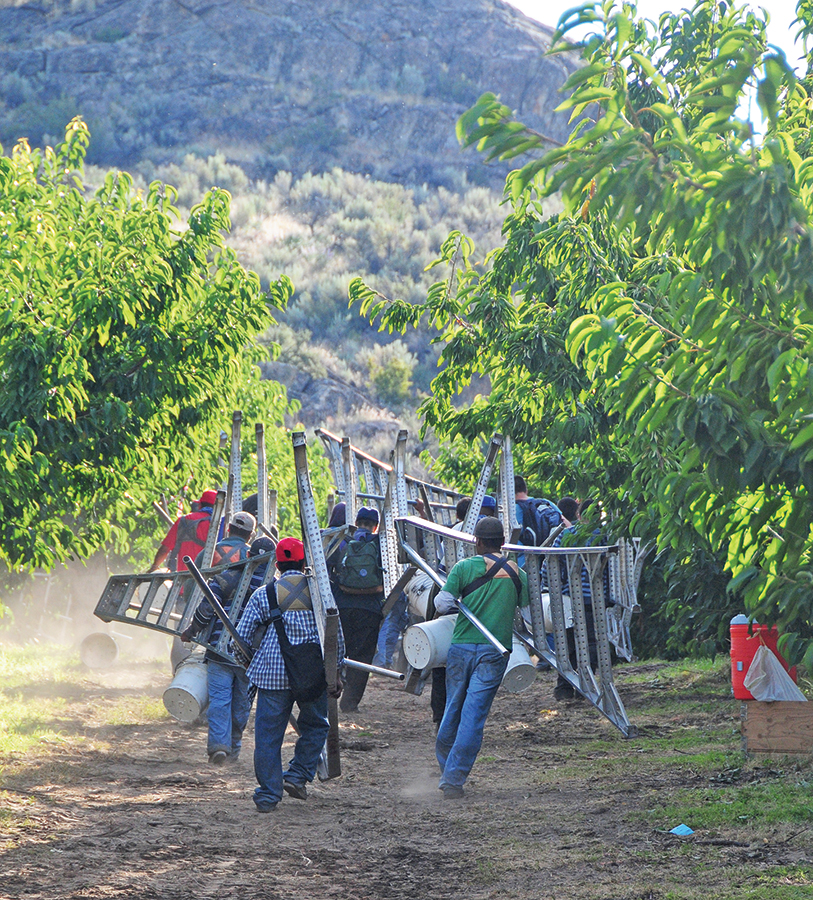
Home » Looking for laborers: Guest worker program seeks funds
Looking for laborers: Guest worker program seeks funds

Washington is one of five states most dependent on H-2A workers in the country -- whose numbers have ballooned in the last decade to about 33,000.
Courtesy Andréa Johnson Photography/Washington State Wine CommissionJune 12, 2019
With a growing number of Washington farm owners turning to the
H-2A guest worker program to meet their labor needs, the cost of administering
and providing oversight of the program now exceeds the federal funding provided
for it.
It’s a scenario that pushed the state Employment Security
Department to turn to the Legislature this year for help.
Use of the temporary agricultural worker program, which allows
agricultural employers to legally use foreign labor to temporarily fill
employment gaps, has increased by more than 1,000 percent since 2009, while the
federal dollars to administer the program have remained flat, according to the
Employment Security Department, which processes H-2A applications, as well as
partners with other state agencies to conduct field checks and other forms of
oversight.
The state Legislature responded to the situation by passing E2SSB
5438 in April 2019, legislation that established an Office of Agricultural and
Seasonal Workforce Services within the Employment Security Department, as well
as authorized the agency to create a 12-member advisory committee that will
take two years to review budget, procedures and policies related to
administering the program.
The original version of the bill looked to
gain additional funding by imposing a state fee on farmers who use the H-2A
program, but that fee was later removed after pushback from farmers and
industry groups. Instead, the Legislature authorized the Employment Security
Department to spend about $3.5 million from another account to address the
needs during the two years of the panel review. However, that funding is not a
sustainable solution, said Suzi LeVine, Employment Security Department
Commissioner.
During its two-year tenure, the advisory committee will further
consider the cost of the program and provide key advice as legislation is
implemented. The committee will include agricultural worker and employer
representatives, as well as officials from other state agencies that the
Employment Security Department partners with to support the agricultural sector.
“This bill helps us better implement the program to meet the needs
of farmers, farmworkers and the people of Washington state overall. It brings
the voices of the farmer and farmworker communities into the room to advise the
program, ensures better oversight in the fields and organizes our resources
more efficiently to deliver a win-win scenario for our state,” LeVine said in a
statement.
The bill also sheds light on the severity of the agricultural
worker shortage in Washington, said Bre Elsey, associate director of government
relations for the Washington Farm Bureau.
The Employment Security Department expects Washington growers to
request about 30,000 temporary agricultural worker visas this year, a figure
that highlights the severity of the worker shortage in the state, she said.
“I think a lot of folks are just unaware of how big the situation
is with labor and with agriculture,” Elsey said. “This program allows us to
find those 30,000 workers so we can harvest the food that everybody eats or
else we just don’t harvest it.”
Even more so, the bill sheds light on a misguided federal funding
structure under which the federal government does not grant money to states in
a manner that scales the funds to need, she said.

Washington is the third largest user of the H-2A visa program but
receives one of the lowest amounts of federal funding to implement it.
Figures provided by the Washington Farm Bureau show that the state
received $19.97 in federal funding per capita in 2016, while Rhode Island, the
state that used the lowest number of H-2A workers that year, received $19,036
in federal funding per capita that year.
Washington had 13,689 H-2A workers in 2016, while Rhode Island had
four.
However, charging farmers a fee to bridge the funding gap would
make it harder for small farms to compete for limited local labor, while having
little effect on the largest farms, Elsey said.
“There’s really large unintended consequences when you mess with
the H-2A program. The people who are impacted the most are not the big
corporations that can afford the inflated wages and can afford to use the H-2A
program,” she said. “It’s the little farmer that you were trying to save ends
up not having any labor.”
In its current form, employers using the H-2A program spend about
$766 per worker on application fees alone, according to the Washington Policy
Center. They are additionally obligated to pay all of their farmworkers $15.03
per hour, rather than the state minimum wage of $12, and they have to provide
housing for workers and cover other costs including travel expenses, food,
child care and other social services.
“The H-2A program is incredibly expensive already and it is a last
resort for farmers and ranchers. They are not seeking H-2A workers first,
they’re seeking them last, so adding additional fees to what is already an
expensive program essentially prices ag labor out of being an option in
Washington state,” said Pam Lewison, agricultural research director for the
Washington Policy Center.
By providing qualified workers who are guaranteed to stay for a
predetermined length of time, H-2A serves as an insurance program that
guarantees work for both sides, Lewison said.
But Andrea Schmitt, a farmworker attorney with Columbia Legal
Services, believes that provision of guaranteed labor can actually create an
unfair work structure and power imbalance between the employer and employee.
As guaranteed laborers who have their visas tied to their
employer, H-2A workers are especially vulnerable to retaliation if they voice
complaints, she said. That retaliation can be immediate or it can be more
subtle, sometimes coming in the form of an employee being marked as a “trouble
maker,” rendering it virtually impossible for them to work under the program in
the future.
“Some of these companies are scary to people. Beyond not giving
work, people feel intimidated by the degree of control that the companies end
up having in communities where huge percentages of the people are working on
H-2A visas,” Schmitt said.
For that reason, it is crucial that the Employment Security
Department have adequate funding to carry out oversight of the program, she
said. In its current form, the department is responsive to complaints but may
not be catching situations where H-2A workers are too intimidated — or don’t
know how — to file a complaint.
“What you have to have is people who can affirmatively get out
there and in a culturally appropriate way build trust with the guys who are
working in these places and actually figure out whether there’s anything wrong
because they’re not going to volunteer that information the first time you talk
to them for five minutes,” she said.
Columbia Legal Services was supportive of the original H-2A bill
that included a state fee to be charged to employers.
Although not supportive of a user fee, the Washington Farm Bureau
also agrees that adequate funding is crucial to proper oversight and
administration of the program. The agency is hopeful that the new advisory
panel will provide a chance for various groups to rally behind the common goal
of pressuring the federal government into allocating more money to the state to
administer the program.
If a funding solution isn’t determined during the advisory
committee’s two-year tenure, the topic of the state fee likely will be
revisited, Lewison said.
In the meantime, stakeholders said they view the creation of the
working group as a positive first step toward beginning to address the
problems.
“We’ve got to be talking about
it because it shows no sign of slowing down in terms of growth,” Schmitt said.
Agriculture + Viticulture
KEYWORDS focus agriculture viticulture 2019





